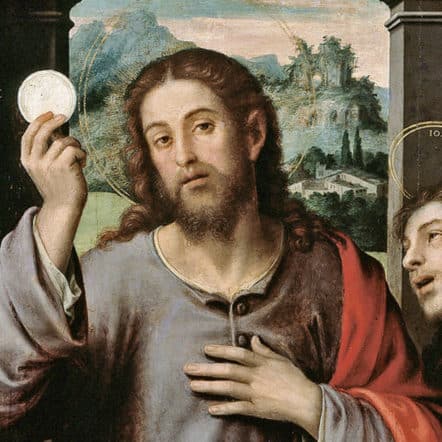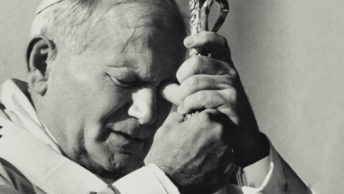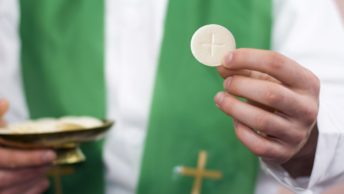We have been living through months and days of unprecedented turmoil in our minds and hearts, and also all around us. The coronavirus, of course, has been making things a lot worse. At the limits of our endurance, we wonder if we could push the proverbial “reset button’ and start anew. The good news is that our God who, in the flesh of His Son Jesus, is fully aware of what thick darkness and intense pain we find ourselves living through already knows that; and replies to our sighs with timeless words and much tenderness.
The one who sat on the throne said, “Behold, I make all things new.” (Revelation 21: 5)
On this Second Sunday in Ordinary Time, the 1st reading (1 Samuel 3:3-10, 19) and Gospel passage (John 1:35-42) deal with a new beginning for three persons handpicked by God: Samuel, Andrew and John. They can be considered the template of us being very dear to our Father’s heart because we are redeemed by Christ’s blood; we are anointed by the Spirit, and are the recipients of a direct invitation by Jesus to come and see where he is staying.
The uniqueness of our Lord interacting with us is revealed in this template by the presence of what the world disdains, woefully lacks and is unable to offer: silence. The noise and the turmoil of this world are contrasted by a setting of stillness and quietness. Notice how young Samuel was sleeping in the silence of the night.
The Gospel passage, too, is respectfully silent about that day spent by John and Andrew with the Lord. In Holy Scripture, any personal encounter with the Lord is shrouded in mystery and in a delicate veil of sacredness which would be torn by any kind of noise and loudness. As with young Samuel and also John and Andrew, in their cases we find a subtle suggestion that we need not spoken words, when we know for certain that we are in the presence of our Lord.
Full openness to a one-way communication: “Speak, Lord, for your servant is listening,” (1 Samuel 3:10) should make us feel comfortable anytime he calls on us because of the mystery of the Incarnation that we celebrated during the Christmas season. We should never forget that the need to let the Lord know about whatever troubles us or to mention to him any concern of ours, is solely for our benefit and to bring us a degree of comfort. In his glorified flesh, the Lord has already full knowledge of our pain.
Hence, paraphrasing what was written about young Samuel, we could say about ourselves: up to this time we are not familiar with the Lord, because the Lord has not revealed anything to us as yet. Or rather, up to now, we have not been quieting our surroundings, minds and our hearts to let the Lord speak to us. Perhaps, we had too many prayers by rote to recite, too many requests to make, too many things to go over with our Lord, too many pressing matters to point out to him. We have shown that, as with young Samuel, we might not yet be familiar with our Lord.
Our mission in life will get into full focus and our turmoil will subside only in a setting in which the voice of the Lord reaches our hearts unimpeded. However, as the Lord speaks to us, we must not be frightened by the trials that our mission and calling entail.
As Samuel became familiar with the voice of the Lord, he remained tranquil and confident in spite of the mounting trials and the hardships that his mission encountered. His sons, who were supposed to take over as he grew old, proved to be an embarrassment to him due to their scandalous behavior. He had to witness the repeated unfaithfulness of the Israelites and King Saul’s unruliness.
And we cannot underestimate the impact that John the Baptist’s words must have had on John and Andrew when he pointed out Jesus to them as the Lamb of God. They soon realized that being disciples of the Lamb of God evoked images of countless sacrifices and shedding of blood. Yet, staying a day with the Lord Jesus reshaped them anew so radically that they recorded the time of that remarkable transformation: It was about four in the afternoon.
Whenever we’ll open our hearts fully and we’ll quiet our souls to allow the Lord to speak to us, the reshaping of our life will undoubtedly conjure up images of sacrifices and spilling of blood—our blood, metaphorically or literally. Yet, we should not be afraid. We are not to trade the turmoil caused in us by the noise of the world for new apprehension about our mission and our calling in life. The presence of the Lord is never temporary, but constant.
Samuel grew up and the Lord was with him, not permitting any word of his to be without effect.
After ”hanging out” with Jesus for many hours, far from being frightened by the images of sacrificial blood referenced by John the Baptist’s words about Jesus, Andrew went home full of enthusiasm; and convinced his brother Simon Peter to become himself a disciple of the Lamb of God.
At Mass, we come and seen where Jesus stays. We also “hang out with him” (for an hour) to quell our inner turmoil and give us abiding trust in the Lord’s infinite power and love. At a certain point, the priest holds the Host over the chalice and addresses us with the very same words John the Baptist used to address John and Andrew: “Behold the Lamb of God […] Blessed are those called to the supper of the Lamb.” May we all react to those words with the same openness and trust that John and Andrew had and treasure the serenity that our trust in the Lord is meant to instill in us.








